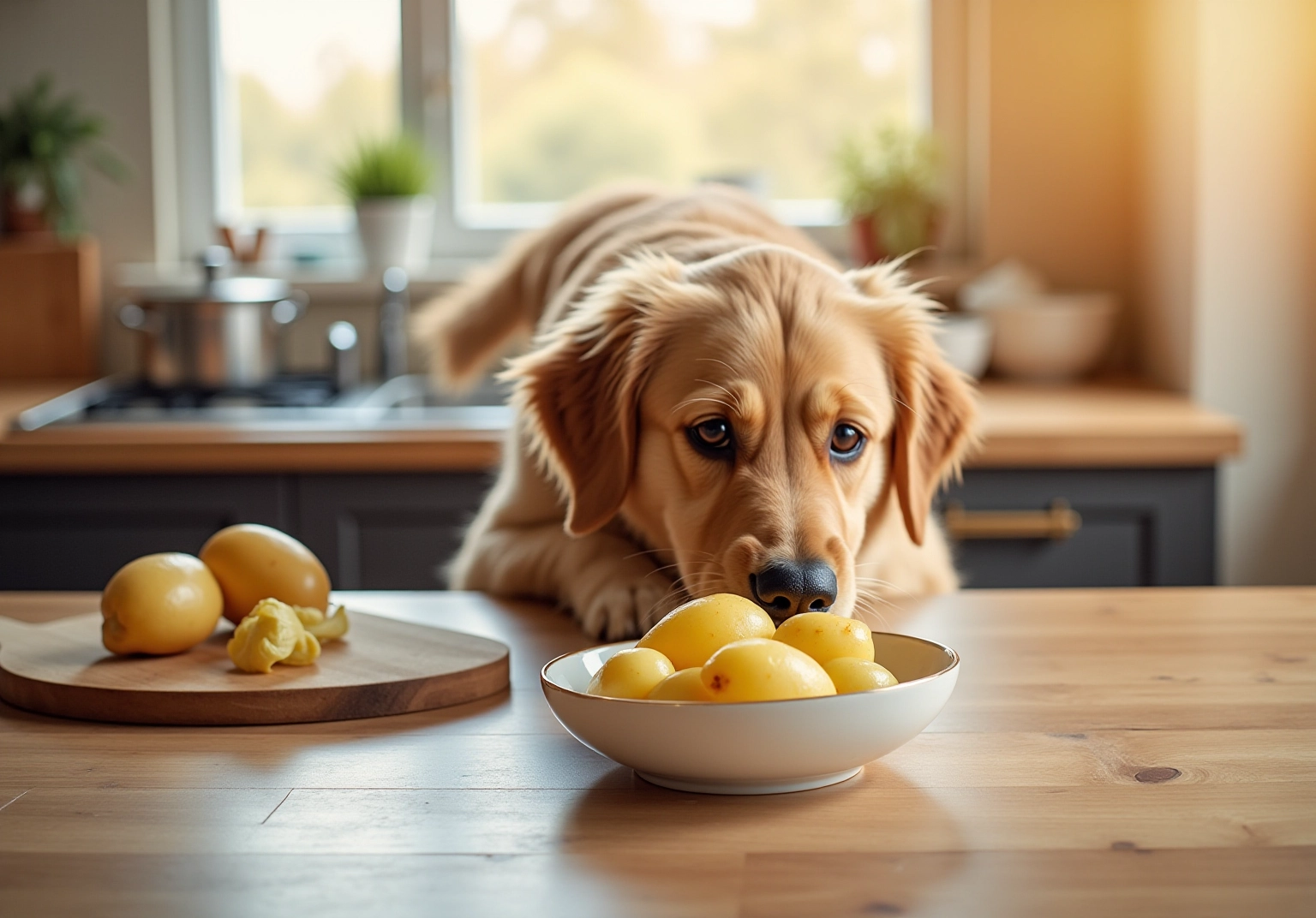
4 Steps to Safely Determine if Can Dogs Have Potatoes
Overview
The article compassionately highlights that dogs can enjoy potatoes when they are prepared safely. It emphasizes the importance of offering only cooked potatoes in moderation to safeguard their health. This guidance is enriched by detailed steps on safe preparation, the necessity of monitoring for any adverse reactions, and the vital role of consulting a veterinarian. Together, these elements reassure pet owners that, with careful attention, potatoes can be a nutritious addition to a dog’s diet, ensuring their well-being without compromising their health.
Introduction
The debate surrounding whether dogs can safely enjoy potatoes is one that many pet owners grapple with, and it’s completely understandable. As loving guardians of our furry companions, we want to ensure that every aspect of their diet contributes positively to their health and happiness.
While these tubers boast essential vitamins and minerals that can enhance a dog’s diet, they also come with potential risks if not prepared correctly. This guide explores the nutritional benefits of potatoes for dogs, the safe methods of preparation, and the crucial steps for introducing them into a pet’s diet.
But how can we, as devoted pet owners, ensure we are making the right choice for our beloved companions without inadvertently causing harm? Together, we can navigate this journey with care and compassion.
Understand the Nutritional Value of Potatoes for Dogs
When prepared with care, the question of can dogs have potatoes arises, as potatoes can be a wonderful addition to your canine’s diet. They are packed with carbohydrates and essential vitamins and minerals, such as vitamin C, vitamin B6, iron, and magnesium. These nutrients are vital for supporting your dog’s immune function, energy metabolism, and overall well-being.
However, it’s important to be aware that raw potatoes contain solanine, a toxic compound, which raises the question: can dogs have potatoes without risking gastrointestinal issues? To keep your furry friend safe, always ensure that only cooked potatoes are included in their meals, especially if you’re wondering, can dogs have potatoes, and serve them in moderation to avoid potential health risks. Excessive consumption can lead to weight gain due to their carbohydrate content, which can be concerning for many pet owners.
Additionally, it’s wise to offer potato skins sparingly, as they contain oxalates that might lead to kidney problems if consumed in large quantities. If you’re looking for a healthier alternative, sweet potatoes are a fantastic choice. They provide even more vitamins and fiber, making them a nutritious option for your dog.
Remember, consulting with a veterinarian before introducing new foods, like potatoes or sweet potatoes, is always a good idea, particularly to understand if can dogs have potatoes. This ensures that your pet’s diet remains balanced and safe, giving you peace of mind as a caring pet owner.
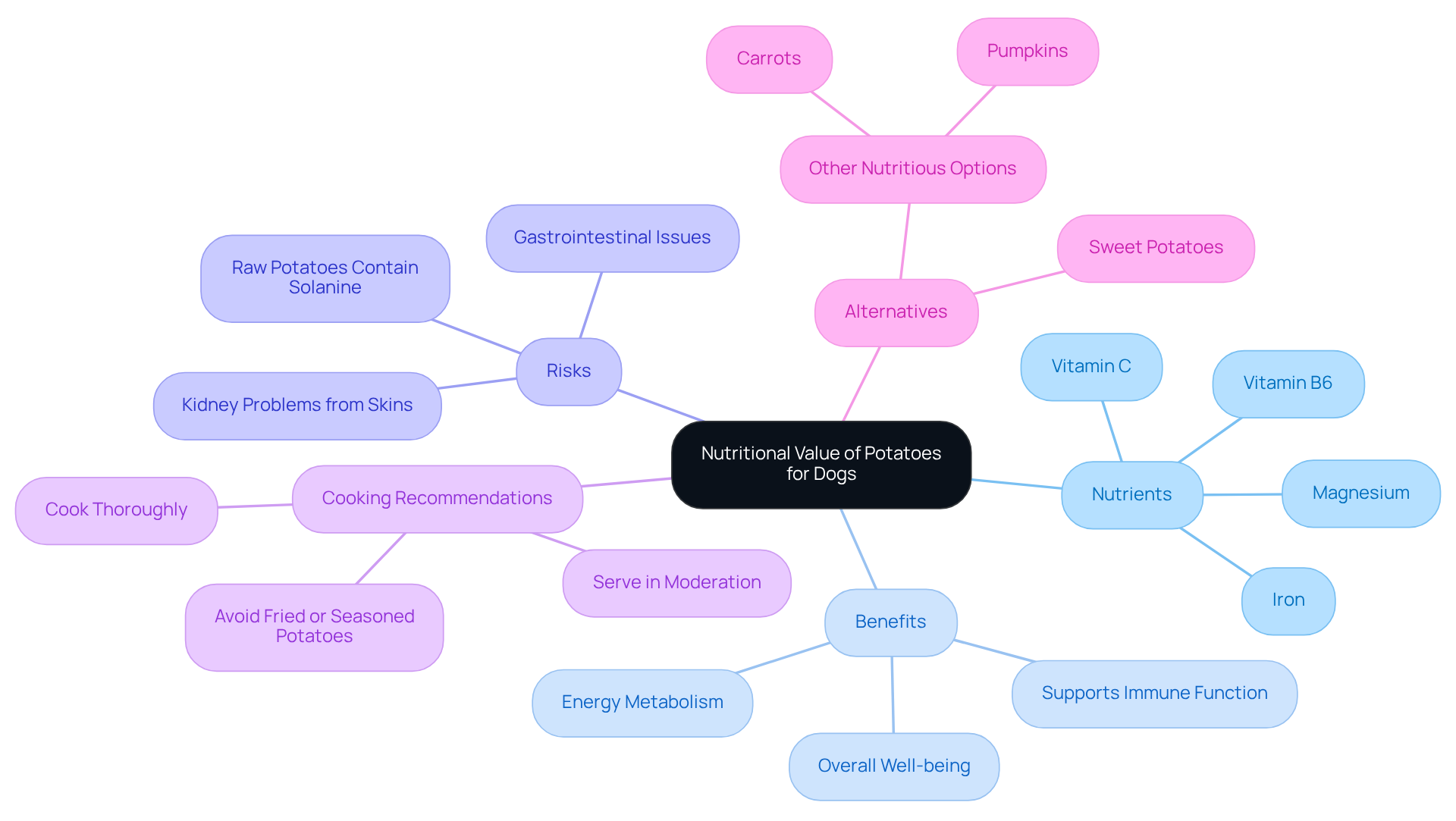
Prepare Potatoes Safely for Your Dog
To prepare potatoes safely for your beloved dog, it’s important to follow these essential steps with care:
-
Choose the right tubers.
Select fresh, firm varieties, steering clear of any with green spots or blemishes, as these may indicate elevated solanine levels that could be harmful to your furry friend. -
Wash thoroughly.
Rinse the tubers under cold water to eliminate dirt and potential pesticide residues, ensuring that what you serve is clean and safe. -
Cook properly.
Utilize boiling, baking, or steaming methods without adding oils, butter, or seasonings. Cooking methods like boiling are particularly effective in minimizing solanine levels, making them safe for canine consumption. As Dr. Danielle Bernal points out, “tubers are safe for canines to consume when thoroughly prepared,” highlighting the importance of appropriate cooking techniques. -
Remove the skin.
Since the skins of tubers can be difficult for dogs to digest, peeling them is advisable before serving, ensuring a gentle experience for their tummies. -
Cut into small pieces.
After cooking, slice the vegetables into small, manageable pieces to reduce choking risks and facilitate easier eating, allowing your dog to enjoy their meal without worry.
It’s essential to recognize that while prepared tubers can be a healthy inclusion in your dog’s meals, one must consider if can dogs have potatoes, as overindulgence may lead to weight gain. By adhering to these recommendations, you can ensure that tubers are a safe and nutritious addition to your dog’s diet, nurturing their health and happiness.
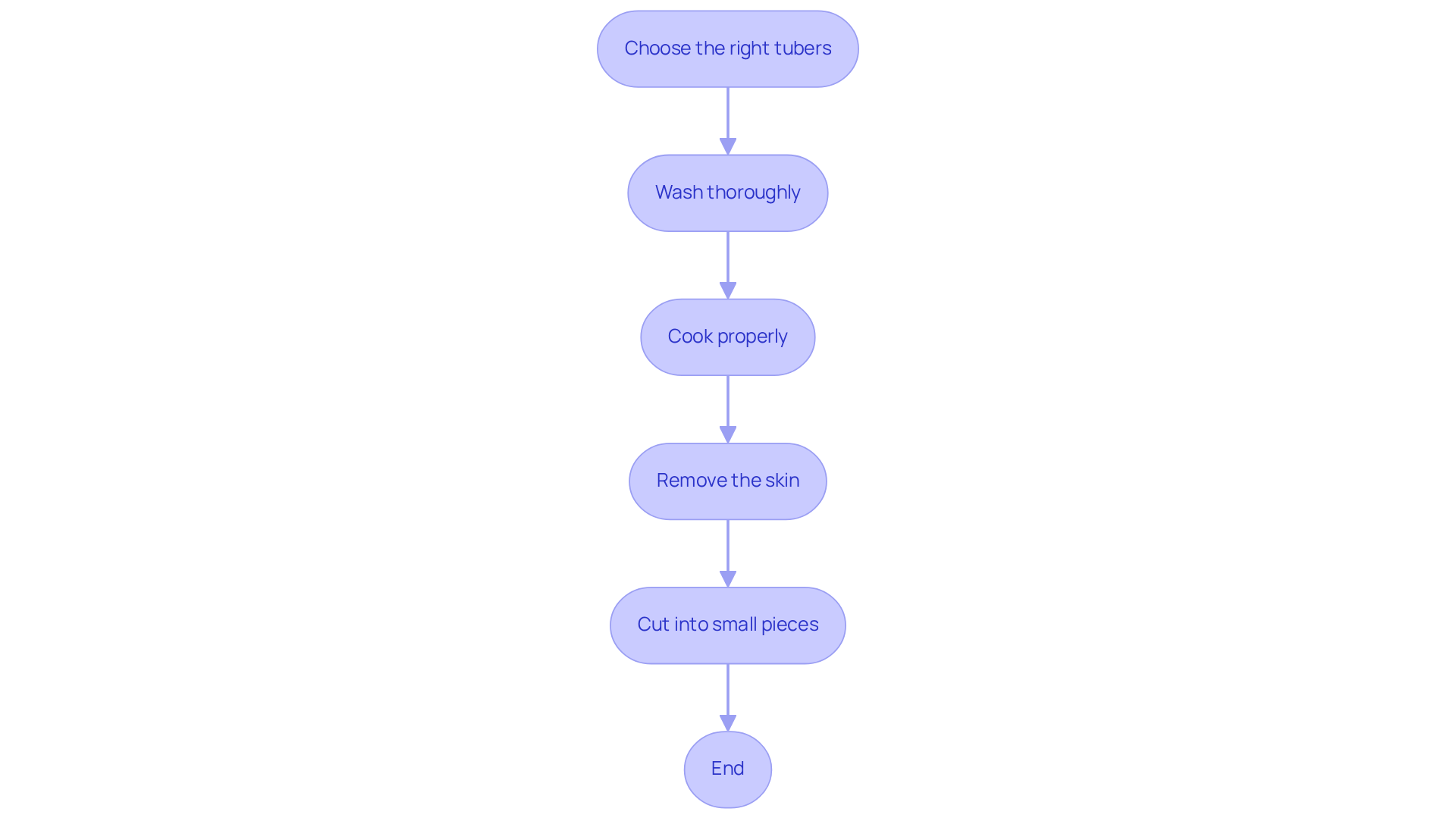
Monitor Your Dog’s Reaction to Potatoes
When considering the question of whether dogs can have potatoes in their diet, it’s important to approach this change with care and attention. Many pet owners worry about how their furry friends might react, and it’s completely understandable. Keep a close eye on your dog for any signs of discomfort or adverse reactions. Common symptoms to be mindful of include:
- Vomiting or diarrhea
- Excessive gas or bloating
- Shifts in appetite or energy levels
If your beloved pet shows any of these symptoms, it’s best to stop feeding them potatoes right away and reach out to your veterinarian for guidance. Experts recommend introducing new foods gradually, in small portions, over a period of 7 to 10 days. This thoughtful approach allows you to monitor your dog’s reactions closely, helping to identify any food intolerances or allergies that may arise, which is essential for their health and happiness.
Additionally, it’s crucial to be aware that uncooked tubers contain solanine, a substance that can be harmful to dogs. Always ensure that any tubers are prepared properly before serving them. As Katherine Ripley wisely points out, tubers should be viewed as an occasional treat, and practicing portion control is vital. Remember, your pet’s well-being is the top priority, and taking these precautions demonstrates your commitment to their health.
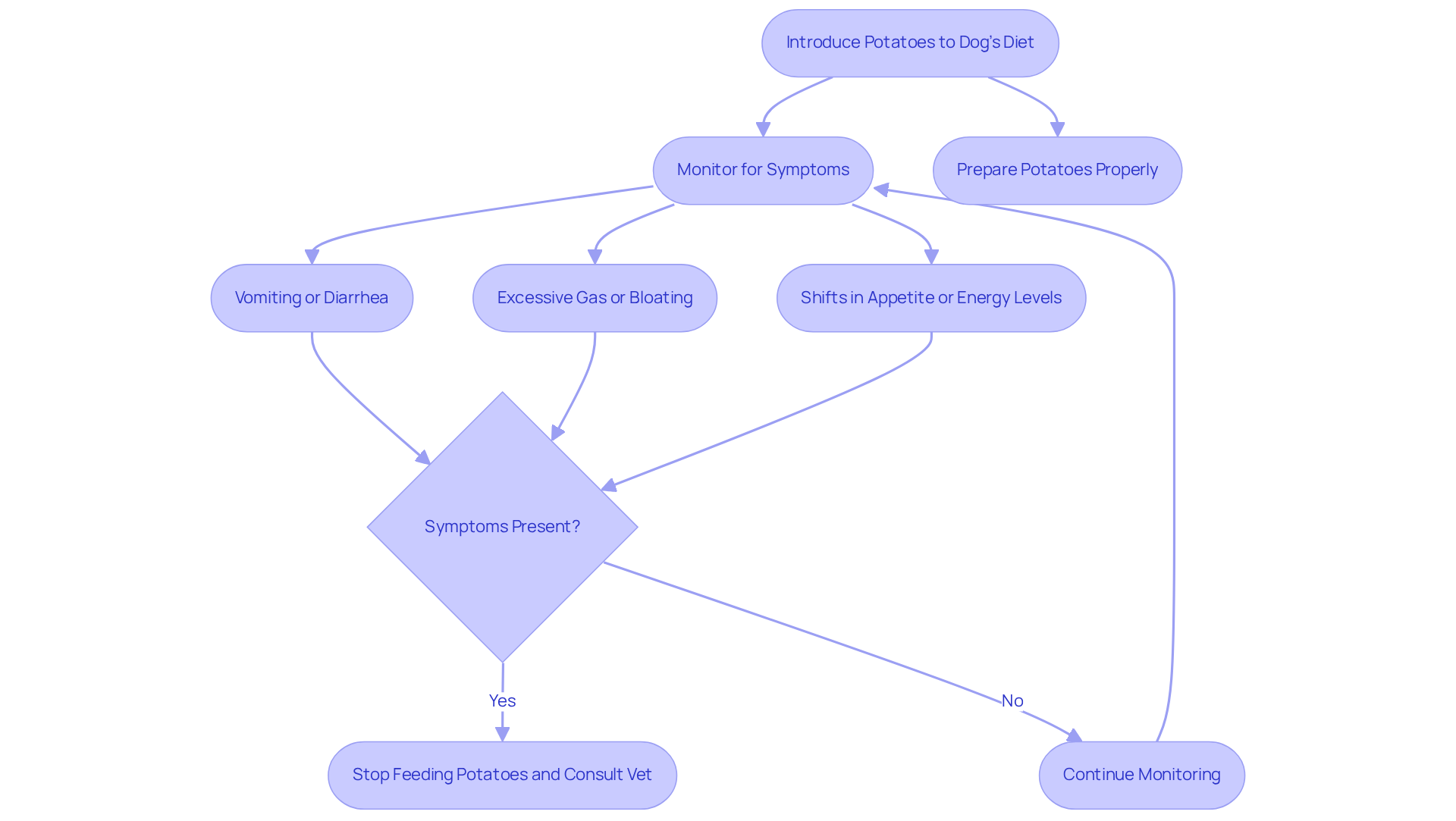
Incorporate Potatoes Gradually into Your Dog’s Diet
To safely determine if can dogs have potatoes in their diet, it’s essential to approach this change with care and consideration for your furry friend’s well-being.
-
Start Small: Begin with a small portion of cooked tuber, roughly a teaspoon for small dogs and a tablespoon for larger breeds. This cautious approach allows you to observe your dog’s tolerance to see if can dogs have potatoes. As Dr. Smith, a pet nutrition expert, wisely notes, ‘Beginning with small quantities enables you to observe how your dog responds to new items, which raises the question, can dogs have potatoes?’ This gentle introduction can help ease any concerns you may have about potential reactions, such as whether can dogs have potatoes.
-
Mix with Regular Food: Combining the tuber with your dog’s regular food not only enhances its palatability but also aids digestion, making the transition smoother for your pet. Many pet owners often wonder, can dogs have potatoes, as they share positive experiences by mixing tubers with their dog’s favorite kibble, turning mealtime into a delightful occasion they eagerly anticipate.
-
Gradually Increase Amount: Over the course of a week, slowly increase the portion size while closely monitoring your dog’s reactions. It’s important to remember that snacks, including tubers, should not exceed 10% of their daily caloric intake to maintain a healthy eating plan, especially when considering if can dogs have potatoes. One pet owner recounted how their dog adapted well to the new food after gradually increasing the quantity over several days, which made them wonder if can dogs have potatoes, highlighting the importance of patience in this process.
-
Maintain a Balanced Nutrition: Ensure that potatoes complement rather than replace essential nutrients in your dog’s meals. While considering the question of can dogs have potatoes, they should be treated as an occasional treat rather than a staple food to preserve the overall nutritional balance vital for your dog’s health. As the caring team at Jet Pet Resort emphasizes, a balanced diet is crucial for your pet’s well-being. By taking these steps, you can confidently assess if can dogs have potatoes in their diet, knowing that you are prioritizing their health and happiness.
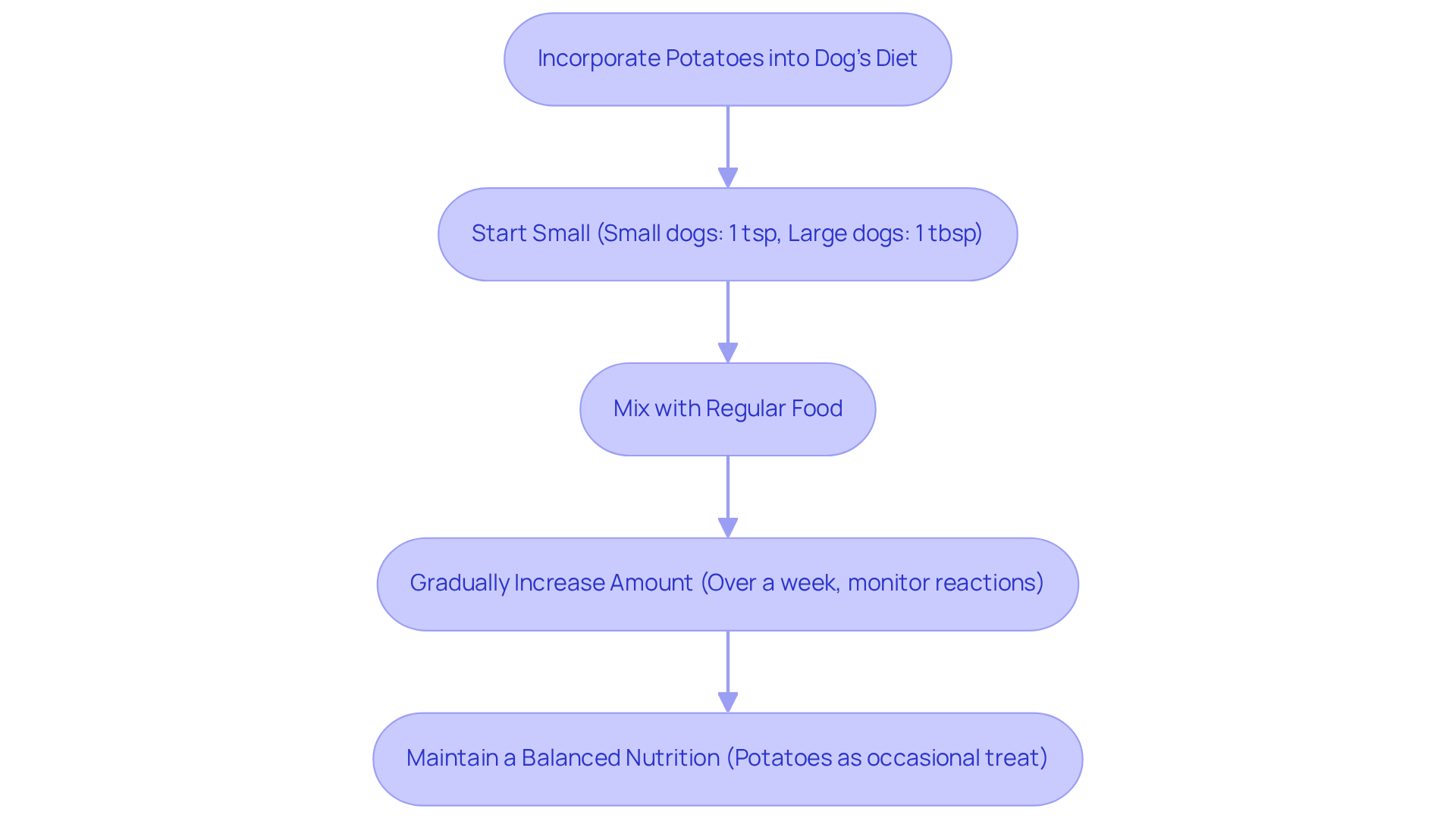
Conclusion
When considering the inclusion of potatoes in your dog’s diet, it’s essential to understand that proper preparation and moderation are key to ensuring their safety and health. Potatoes, when cooked correctly, can provide valuable nutrients that support your dog’s overall well-being. However, it’s crucial to approach this addition with caution to avoid potential risks associated with solanine and other harmful compounds found in raw potatoes.
This article outlines essential steps for safely introducing potatoes to your dog’s diet:
- Selecting fresh tubers
- Employing proper cooking methods
- Closely monitoring for any adverse reactions
Starting with small portions, mixing them with regular food, and gradually increasing the amount while ensuring that potatoes do not exceed 10% of your dog’s daily caloric intake are vital practices. These steps not only enhance your dog’s meals but also foster a healthy relationship with food.
Ultimately, the key takeaway is that while potatoes can be a nutritious addition to your dog’s diet, they should be treated as an occasional treat rather than a staple. As a caring pet owner, you are encouraged to consult with veterinarians before making any dietary changes and to remain vigilant in observing your dog’s reactions to new foods. By prioritizing safety and nutrition, you can confidently explore the question of whether dogs can have potatoes, ensuring your furry companions thrive in health and happiness.
